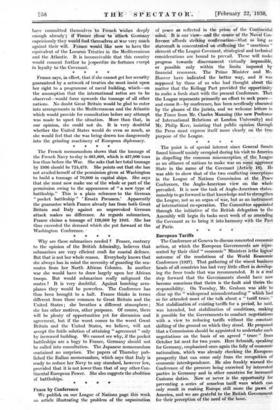European Tariffs The Conference at Geneva to discuss concerted economic
action, at which the European GOvernmenti are repre- sented by their chief " economic" Ministers is the logical outcome of the resolutions of the World Economic Conference (1927). That gathering of the wisest business heads of all countries has had very little effect in develOp- ing the freer trade that was recommended. It is a real step forward that the GovernmentS should have now become conscious that theirs is the fault and theirs the responsibility. On Tuesday, Mr. Graham was able •to clear up the "widespread misunderstanding "- Whichliad so far attended most of the .talk about a " tariff truce." Not stabilization of existing tariffs for a period,- lie -said, was intended, but stabilization of conditions, making it possible for the Governments to condUct negotiations with a view to reducing, tariffs without the constant shifting of the ground on' which they stood. He proposed that a Commission should be appointed to undertake such negotiations on the basis of an agreed " truce " from October 1st next for two years. Herr Schmidt, speaking for Germany, emphasized once again the folly of economic nationalism, which was already checking the European prosperity that can come only from the recognition of economic interdependence. He also frankly warned the Conference of the pressure being exercised by interested parties in Germany and in other countries for increased Customs duties. Now or never is the opportunity for preventing . a series . of senseless tariff wars which can only result in making Europe still more the pawn of America, and we are grateful to the British Government for their perception of the need of the hour.










































 Previous page
Previous page